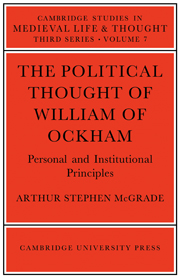Book contents
- Frontmatter
- Contents
- Preface
- Abbreviations
- 1 OCKHAM AS A POLITICAL THINKER
- 2 THE PROBLEM OF RADICAL ACTION
- 3 THEORY OF INSTITUTIONS: SECULAR AND SPIRITUAL GOVERNMENT
- 4 POLITICS AND PHILOSOPHY: NATURAL RIGHT AND THE ETHICAL BASIS FOR OCKHAM'S POLITICAL IDEAS
- 5 POLITICS AND THEOLOGY: SECULAR POLITICS AND CHRISTIAN VIRTUE
- CONCLUSION: OCKHAM AS A CONSTRUCTIVE POLITICAL THINKER
- Bibliography
- Index of passages in Ockham quoted, discussed, or cited
- Index of names
- Subject index
CONCLUSION: OCKHAM AS A CONSTRUCTIVE POLITICAL THINKER
Published online by Cambridge University Press: 16 October 2009
- Frontmatter
- Contents
- Preface
- Abbreviations
- 1 OCKHAM AS A POLITICAL THINKER
- 2 THE PROBLEM OF RADICAL ACTION
- 3 THEORY OF INSTITUTIONS: SECULAR AND SPIRITUAL GOVERNMENT
- 4 POLITICS AND PHILOSOPHY: NATURAL RIGHT AND THE ETHICAL BASIS FOR OCKHAM'S POLITICAL IDEAS
- 5 POLITICS AND THEOLOGY: SECULAR POLITICS AND CHRISTIAN VIRTUE
- CONCLUSION: OCKHAM AS A CONSTRUCTIVE POLITICAL THINKER
- Bibliography
- Index of passages in Ockham quoted, discussed, or cited
- Index of names
- Subject index
Summary
Cum igitur constet, quod papa, cui dixit Christus in beato Petro: Pasce oves meas, de fidelibus sollicitam curam gerere teneatur … relinquitur, quod principatus papalis institutus est propter utilitatem subiectorum et non propter utilitatem propriam vel honorem, et per consequens non dominativus, sed ministrativus est digne vocandus.
Since, therefore, it is clear that the pope, to whom Christ said [in the person of] blessed Peter, ‘Feed my sheep’, is bound to take solicitous care of believers… it follows that papal government was instituted for the utility of its subjects and not for its own utility or honor, and consequently it deserves to be called not dominative but ministrative.
De Imperatorum et Pontificum Potestate, c. 6, p. 460Ockham's political thought must be assessed as a response to the potentialities and ideological chaos of the world in which it was produced. The problems of Ockham's age are vividly suggested by Pierre de Flotte's taunt at Boniface VIII, which from one standpoint or another could have been applied to every person or institution discussed in this study: ‘Your power is verbal, but ours is real.’ From a curialist point of view, de Flotte had reversed the true situation. Supreme spiritual power, far from being merely verbal, was more real than that of any secular government, while a ruler who lost the papacy's favor deserved to lose even such subordinate temporal power as he had. From this viewpoint, Ludwig of Bavaria, whose election had never been approved by the pope, was juristically speaking a wholly unreal emperor. Even with papal approval, however, the empire's universal power was questionable in practice.
- Type
- Chapter
- Information
- The Political Thought of William Ockham , pp. 207 - 231Publisher: Cambridge University PressPrint publication year: 1974



